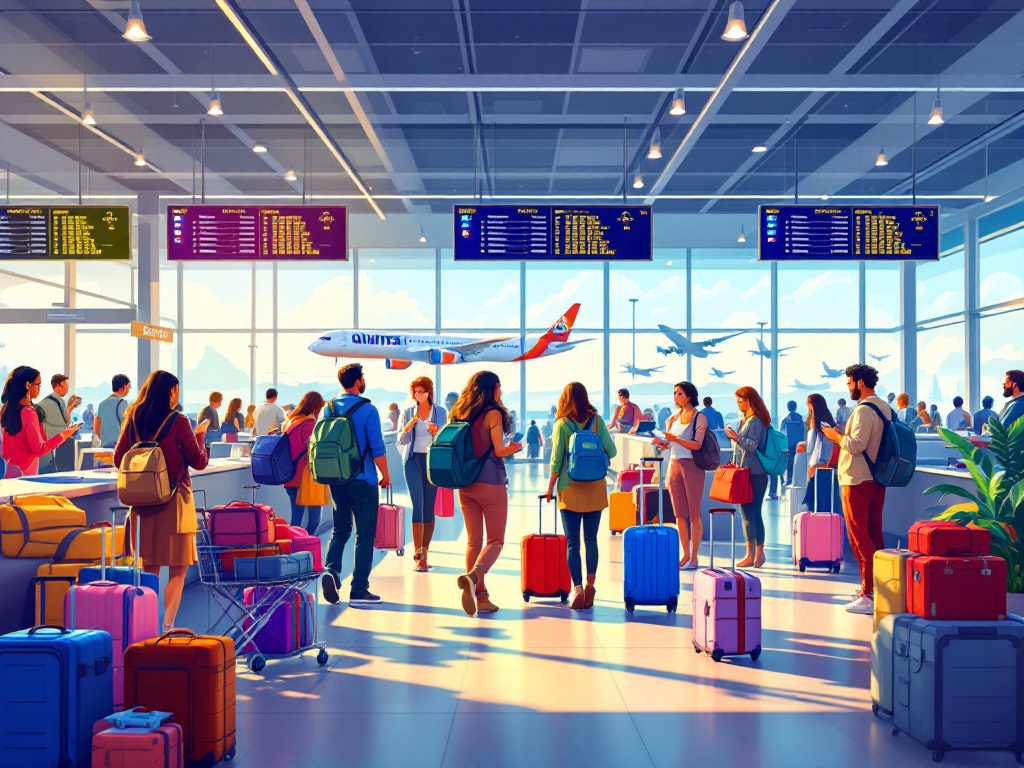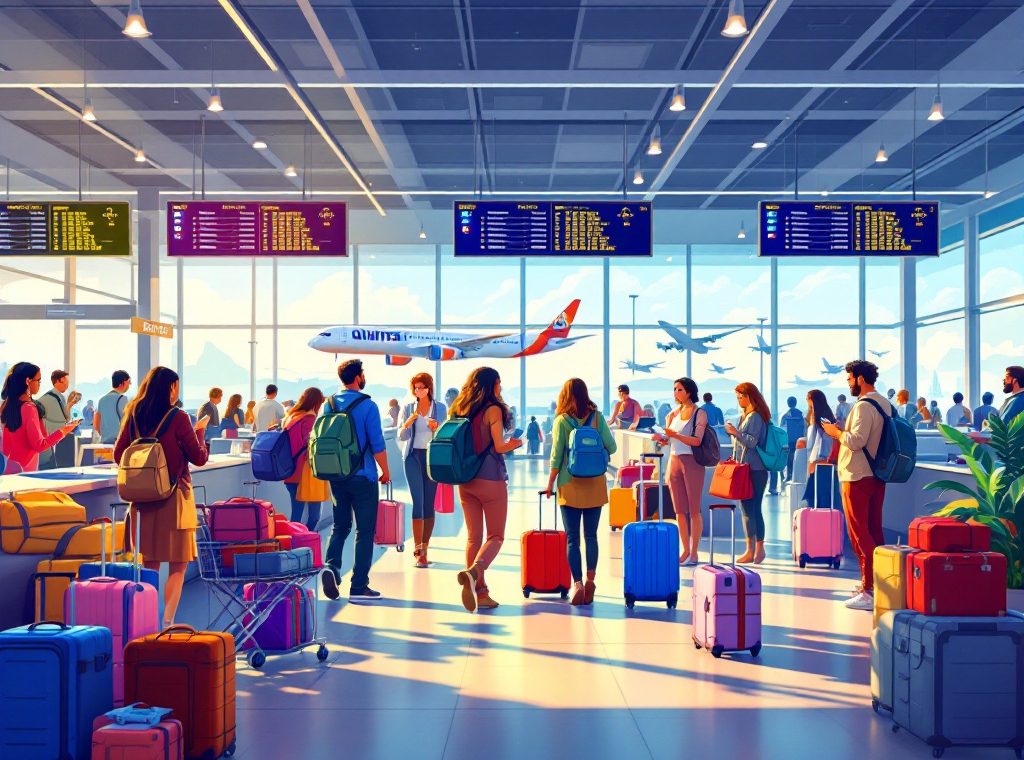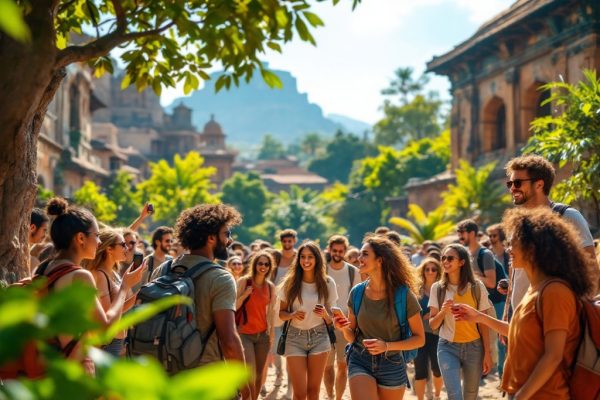Going Overseas: Tips for Travelers
Embarking on an international adventure? Ensure smooth travels with our comprehensive guide, covering crucial steps from passport and visa checks to packing essentials and navigating airport procedures. Learn about health precautions, cultural etiquette, managing finances abroad, and staying connected. Prepare for a stress-free journey and maximize your travel experience. Start planning your trip today!
Important information

- Ensure your passport is valid for at least six months after your return date, and obtain necessary visas in advance.
- Research your destination’s customs, traditions, and local laws. Learn basic phrases to show respect and enhance interactions.
- Pack light with versatile clothing. Bring essential medications, a universal adapter, and a basic first-aid kit.
- Consult your doctor about recommended vaccinations and health precautions specific to your destination. Secure travel insurance.
- Make copies of important documents and store them securely, both physically and digitally.
Preparing for International Travel
Preparing for an international trip requires careful planning. Start by ensuring your passport and visas are up-to-date. Research your destination’s customs and traditions. Learning a few local phrases demonstrates respect and can significantly improve your interactions. Pack lightly with versatile clothing items to maximize space and minimize baggage fees. Remember essential items such as medications, a universal adapter, and a basic first-aid kit. Consult your doctor about recommended vaccinations and necessary health precautions specific to your destination. Adequate travel insurance is crucial in case of unexpected events. Finally, copy important documents and store them securely, both physically and in cloud storage, to safeguard against loss or theft.
Passport and Visas: Ensure your passport is valid for at least six months beyond your intended stay and obtain any necessary visas well in advance.
Research and Respect: Thoroughly research your destination’s customs and traditions. Learning a few basic local phrases can enhance your experience and show respect for the local culture.
Smart Packing: Pack lightly with versatile clothing items to save space and avoid excess baggage fees. Consider the climate and activities you’ll be participating in.
Essential Items: Don’t forget essential items like medications, a universal adapter, and a basic first-aid kit. These can be lifesavers in unfamiliar environments.
Health and Safety: Consult your doctor about recommended vaccinations and health precautions for your destination. This will help you stay healthy and avoid potential health issues.
Travel Insurance: Secure adequate travel insurance to cover unexpected events such as medical emergencies, trip cancellations, or lost luggage.
Document Security: Copy important documents and store them securely, both physically and in cloud storage, safeguarding against loss or theft.
Essential Travel Documents You Need
Ensure your passport’s validity extends at least six months beyond your planned return date.
Investigate visa requirements for your destination, as they vary based on nationality and country.
Carry other essential identification documents and create photocopies of everything.
Scan these documents digitally to create a secure backup in case of loss or theft.
Thoroughly research and comply with all health guidelines for your destination to ensure a smooth and healthy trip.
Understanding Passport and Visa Requirements
Your passport must be valid for six months beyond your trip. Depending on your nationality and destination, a visa may be required. Visa rules vary by country.
Making Copies of Important Documents
Photocopy your passport and visa. Keep the copies separate from your original documents.
Store digital copies of your passport and visa online in a secure location. This will protect you if your physical documents are lost or stolen.
Considering Overseas Travel Insurance
Travel insurance protects you from unexpected costs and problems during international trips. It covers trip cancellations, medical emergencies, lost luggage, and travel delays. This financial safety net is especially helpful in foreign countries where healthcare can be expensive. Travel insurance also offers assistance services for peace of mind and support in unexpected situations.
Researching Your Destination
Planning your trip effectively involves several key steps. Start by checking visa requirements and researching necessary vaccinations and health precautions. Staying informed about local health advisories is crucial for a safe and healthy journey.
Cultural Immersion
Immerse yourself in the local culture by learning about customs and traditions. Respectful interactions are essential. Knowing basic phrases in the local language can significantly enhance your travel experience.
Financial Preparation
Before you go, research the local currency, exchange rates, and accepted payment methods. Familiarize yourself with tipping customs. Carrying some local currency can be very convenient.
Checking Entry Requirements and Health Precautions
Planning your next trip? Start by researching the entry requirements for your destination, which may include a visa. Some countries also require specific vaccinations or a negative COVID-19 test. Consult your doctor about recommended vaccinations and necessary health precautions. For the latest health advisories and travel notices, check the CDC and WHO websites.
Research entry requirements. Check if your destination requires a visa, specific vaccinations, or a negative COVID-19 test.
Consult your doctor. Discuss recommended vaccinations and necessary health precautions for your trip.
Check health advisories. Stay updated on the latest travel notices and health recommendations from the CDC and WHO.
Understanding Cultural Differences and Customs
Research local customs and traditions before your trip. This will help you understand and appreciate the local culture.
Learn a few basic phrases in the local language. This shows respect and can be helpful in everyday situations.
Understand dining etiquette, including dress codes and acceptable public behavior. This will help you feel more comfortable and avoid any cultural misunderstandings.
Engage with locals and be open-minded to different lifestyles. This can lead to enriching experiences and new perspectives.
Respect cultural differences, even if they are different from your own. This is crucial for a positive and respectful travel experience.
Exploring Local Currency and Money Matters
Planning an international trip requires understanding the local currency to manage your expenses effectively. Exchange rates can fluctuate, so consider this when budgeting. Familiarize yourself with local banking customs and payment options. Credit cards and mobile payment apps are widely accepted, and ATMs are readily available, but be aware of potential fees. Carrying some local cash is recommended for smaller expenses like taxis and tips. Prepaid travel cards are another option, offering increased security and budget management.
Managing Your Money Abroad
Understanding the local currency and its exchange rate is essential for effective budgeting. Factoring in potential fluctuations helps avoid financial surprises.
Consider these tips:
- Research the current exchange rate and its recent trends.
- Factor potential rate changes into your budget.
- Set up a travel notification for your bank to prevent issues with your cards.
Payment Methods and Banking
While credit cards and mobile payment apps are widely accepted, and ATMs are generally accessible, it’s wise to be prepared for other scenarios.
Keep in mind:
- Be mindful of potential fees for international transactions and ATM withdrawals.
- Carry some local cash for smaller expenses like tips, taxis, or local markets.
- Prepaid travel cards offer enhanced security and budget control.
Planning Your Travel Itinerary and Budget
Trip Planning
A well-crafted itinerary is essential for a successful trip. Planning your destinations, activities, accommodations, and transportation in advance ensures smoother travels and minimizes potential issues.
- List destinations.
- Schedule activities.
- Book accommodations and transportation.
Budgeting
A realistic travel budget is key to a stress-free trip. Factor in all expenses, including pre-trip costs, accommodation, transportation, food, activities, and souvenirs.
- Consider visas, vaccinations, and travel insurance.
- Account for accommodation, transportation, food, activities, and souvenirs.
- Track your spending to avoid financial stress.
Creating a Comprehensive Travel Itinerary
Planning your trip in advance is key to a successful travel experience. Booking flights, accommodation, and transportation ahead of time helps manage expenses and ensures smoother transitions between destinations. A detailed itinerary outlining daily activities maximizes your time and minimizes on-the-spot decisions, reducing travel stress. Advance planning also allows for smarter budgeting, letting you allocate funds to sightseeing, dining, or other experiences. While a structured itinerary is recommended, it’s important to maintain some flexibility for spontaneous adventures.
Budgeting for Travel Expenses
Craft a Realistic Budget
Create a comprehensive travel budget that includes lodging, transport, meals, activities, and a buffer for unforeseen expenses. Consider using local currency for optimal exchange rates.
Smart Spending Habits
Discover budget-friendly eateries and explore free local attractions to minimize costs. Keep cash on hand for minor purchases.
Track Your Expenses
Monitor your spending daily to stay within your budget. Utilize budgeting apps to easily track and manage your finances.
Plan and Book Ahead
Pre-book tours and activities to secure potential discounts and guaranteed availability.
Financial Preparations
Notify your bank of your travel dates. Carry a mix of cash, credit cards, and travel money cards for varied payment options.
Manage Exchange Rates
Be mindful of exchange rates and associated fees. Opt for ATMs with favorable rates to minimize transaction costs.
Booking Transportation and Accommodation Options
Planning your trip involves key decisions, including transportation and accommodation.
Transportation
- Airplanes: offer speed but can be expensive.
- Trains: provide scenic journeys, balancing cost and time.
- Buses: a great option for budget travelers.
- Rental cars: offer flexibility but can be costly.
Accommodation
- Hostels: basic necessities for budget travelers.
- Hotels: comfortable amenities, with options for luxury.
Consider your priorities and budget to make the best choice.
Comparing Transportation Options
Public transport is often the most budget-friendly choice, but it may not be the fastest option.
Taxis offer speed and convenience, but they can be expensive.
Rental cars provide freedom and flexibility, allowing you to explore at your own pace, but they come with a higher cost and the responsibility of driving.
Evaluate your needs and budget to select the best travel option for a smooth trip.
Choosing the Right Accommodation
When selecting accommodations, consider location, amenities, and price. Booking in advance often secures better rates and a wider selection. Evaluate the area’s accessibility and proximity to your desired attractions. Consider these factors:
- Location: choose a location that is convenient for your needs, whether it’s close to the city center, the beach, or specific attractions,
- Amenities: determine which amenities are important to you, such as free Wi-Fi, breakfast, a swimming pool, or parking,
- Price: set a budget and compare prices from different hotels or rental properties.
Booking ahead often offers advantages:
- Better rates: advance bookings can often secure lower prices, especially during peak season,
- Wider selection: booking early gives you a greater choice of accommodations, ensuring you find the perfect fit for your preferences.
Evaluate these aspects of the area:
- Accessibility: consider the transportation options available, such as public transport, taxis, or car rentals,
- Proximity to attractions: choose accommodations that are close to the places you want to visit, saving you time and travel costs.
Packing Tips for Travelers
Pack smart for your trip with versatile, layerable clothing. Don’t forget travel-sized toiletries, device chargers, and any necessary medications. For international trips, pack a universal adapter and copies of important documents, such as your passport and visa. A small first-aid kit is also a good idea.
Organize Your Luggage
Packing cubes and compression bags help maximize luggage space. A reusable water bottle is essential for staying hydrated.
Enhance Your Comfort
A travel pillow, eye mask, and noise-canceling headphones can make your journey more enjoyable, especially on flights or in noisy environments. A portable charger will keep your devices powered up.
Essentials for a Smooth Trip
Traveling light makes a trip much more enjoyable. A small suitcase or backpack is easier to handle than bulky luggage. Pack versatile clothing items to create various outfits without overpacking. Remember essential toiletries and medications in travel-sized containers to save space. A universal adapter will keep your electronics charged, while a reusable water bottle ensures you stay hydrated on the go. Here’s how to pack light:
- Choose a small suitcase or backpack.
- Pack versatile clothing items.
- Use travel-sized toiletries and medications.
- Bring a universal adapter.
- Carry a reusable water bottle.
Travel Accessories to Consider
Enhance your travel experience with a few key items. A travel pillow offers welcome support on long flights and train journeys. A universal adapter ensures you can charge your devices wherever you go. A portable charger provides backup power when outlets are unavailable. Noise-canceling headphones create a tranquil haven, blocking out distractions and promoting relaxation. Carry a reusable water bottle to stay hydrated throughout your adventures.
Health and Safety Precautions
Health and Safety Essentials
Pack a well-stocked first-aid kit with essentials like pain relievers, bandages, antiseptic wipes, and any personal prescriptions. Consult your doctor about recommended vaccinations and necessary medications.
- Pain relievers,
- Bandages,
- Antiseptic wipes,
- Personal prescriptions,
- Recommended vaccinations and necessary medications.
Don’t forget personal protection items:
- Insect repellent,
- Sunscreen,
- Hand sanitizer.
Combatting Travel Fatigue and Jet Lag
Proactively address travel fatigue and jet lag with these steps:
- Stay hydrated,
- Exercise regularly,
- Gradually adjust to your destination’s time zone.
Before departure and upon arrival:
- Shift your sleep schedule incrementally,
- Expose yourself to natural light,
- Avoid caffeine and alcohol.
These simple steps can significantly improve your travel experience.
Packing a First Aid Kit and Personal Protection Supplies
Preparing for your trip involves assembling a comprehensive first aid kit. Pack essential items such as pain relievers, bandages, antiseptic wipes, and any personal medications. For added comfort and safety, include sunscreen, insect repellent, and motion sickness remedies. To safeguard your health, bring water purification tablets or a portable water purifier. Before you travel, schedule a consultation with your doctor to discuss necessary vaccinations and medications specific to your destination.
Addressing Travel Fatigue and Jet Lag
Travel fatigue is a common consequence of busy itineraries, but taking breaks can help alleviate it. Jet lag also presents a challenge, but minimizing its effects is possible. Maintaining consistent sleep patterns before, during, and after your trip, even on weekends, helps regulate your body clock. A relaxing bedtime routine can also improve sleep quality and ease the transition to new time zones.
Connectivity and Communication Abroad
Staying connected while traveling is now simpler than ever. Here are a few options:
Staying Connected
- Local SIM card: An economical choice for calls and data.
- International roaming: Convenient but compare costs with your provider.
- Wi-Fi: Widely available in hotels, cafes, and public areas.
Travel Tip
Download offline maps and translation apps before you go.
Enhance your travel safety by staying in touch with someone back home, especially when traveling solo.
Share Your Itinerary
- Accommodation details.
- Planned activities.
Regular Check-ins
- Use messaging apps, video calls, or social media.
- Inform your contact person of any changes to your plans.
This will give both you and them peace of mind.
Exploring Connectivity Options
To save money on data and calls, a local SIM card is a great option.
Alternatively, check if your current provider offers international roaming.
Portable Wi-Fi hotspots are also convenient, but remember to check data limits, speed, and coverage before committing.
Selecting the right connection is crucial for a smooth travel experience.
Keeping in Touch with Someone Back Home
Staying connected while traveling is easier than ever. From messaging apps like WhatsApp and Messenger to international calling plans, you have many options for staying in touch. While carrier plans can be expensive, internet-based services like Skype and FaceTime offer cost-effective alternatives. Email and social media platforms provide additional ways to communicate. The best method depends on your budget, data access, and personal preferences. Regularly checking in with family and friends enhances your safety and provides peace of mind.
Communication Methods While Traveling
- Messaging apps (e.g., WhatsApp, Messenger),
- International calling plans,
- Internet-based services (e.g., Skype, FaceTime),
- Email,
- Social media platforms.
Choosing the Right Method
Consider these factors:
- Your budget,
- Data access,
- Personal preferences.
Regular check-ins with loved ones enhance your safety and peace of mind.
Airport Travel Tips for a Hassle-Free Experience
Online check-in helps expedite the airport process, but arriving early remains crucial. Once at the airport, proceed through security and find your designated gate.
For security screening, ensure easy access to electronics and liquids by packing them separately in your carry-on. Remember to empty water bottles before security and refill them afterward.
Keep your boarding pass and ID readily available. Upon reaching your gate, confirm the boarding time and stay informed about potential gate changes. Keep track of your belongings at all times.
For international travel, ensure you have your passport and any necessary visas. Familiarize yourself with the destination’s regulations and consider travel insurance in case of unexpected events. Pack any required medications and health documents.
Research local transportation options from the airport. Keep local emergency contact information readily accessible.













